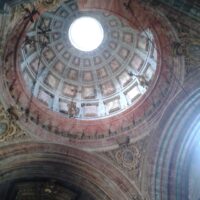000
100
%
Religions and Beliefs

Présentation
This area is open to new subjects beyond Christianity (which has been and remains a core focus), developing cross-disciplinary approaches with the laboratory’s other areas of research and highlighting the transnational issues that have emerged in the field of religion. The movement of men and women; exchanges of ideas, devotions, and practices; diplomacy, and partisan commitments constitute topics which are structured into three thematic sections (see below). To strengthen the cohesion of the division, a theme common to all researchers has been chosen, centred on the notion of ‘engagement’. This is understood in its broadest dimensions (beliefs, arms, militancy) and takes into account the chronological arc of the laboratory, from the sixteenth to the twenty-first century.
This division follows in the footsteps of the Lyonnais school of religious history, which has had a major influence on scientific production since the 1960s, and intends to continue the renewal of its fields of research begun during the previous contract.
Thématique 1
Circulations (led by Olivier Chatelan and Bruno Dumons)Circulations (led by Olivier Chatelan and Bruno Dumons)
Following on from the studies carried out on the missions and the Huguenot Refuge, this area is developing projects inspired by transnational or global issues. For specialists in Catholicism, the Roman centre is a priority subject, provided that we break with the vision of a unilateral diffusionism of the West towards passive peripheries. For the seventeenth and eighteenth centuries, researchers continue to work on the Jansenist refuges (France, the United Provinces, the Spanish Netherlands) that were established in the face of repression. Much work has already been dedicated to the international dimension of Protestantism. Our aim is to take it up again with new themes such as the circulation of Huguenot artists. For contemporary Protestantism, the focus will be on issues relating in particular to transatlantic solidarity in the Catholic sphere (the movements of nuns and priests). Work on images (comics) is also included in this area, with the same transnational approach based on the development and circulation of models.
Thématique 2
Religious Ideas (led by Yves Krumenacker)
Our objective is to analyse the production, development and dissemination of religious ideas, whether scholarly (theology) or popular (catechisms, sermons), and to study the centres of such ideas and the people behind them. Integrating the construction of knowledge into the themes of this area entails a commitment to exploring other areas and encouraging collaborative work. Two projects are already under development. The first is in the field of theological ideas, where the aim is not so much to study the content from the perspective of the classical history of theology as to examine the development of these ideas, their reception, and possible repercussions in society. The second is an extension of an earlier project on religious books, concentrating on books of piety, ephemera, the readings of nuns, hagiography, pilgrimage booklets, and books produced for the use of the clergy.
Thématique 3
Governance and Religion (Bernard Hours, Christian Sorrel)
This theme focuses on the religious foundations of political models, the governance of Churches and the role of religious figures in processes of social control. Two projects are being developed. The first concerns modern religious orders, by the examination of constitutions, the study of debates linked to internal reforms and reorganisations required by state governments, and a prosopographical approach to tracing careers in the machinery of governance. The second project is linked to the opening of the archives of the pontificate of Pius XII, the scope of which will lead to a substantial renewal of historiography from a national and transnational perspective. Specific attention will be paid to “Pius XII and France”, but the LARHRA is first and foremost involved in an international project entitled “Reconstructing the world, societies, and the human person (1939-58): the global contribution of the Vatican archives”, which is currently being concluded with European partners at the École française de Rome.
